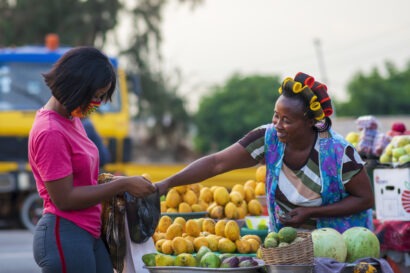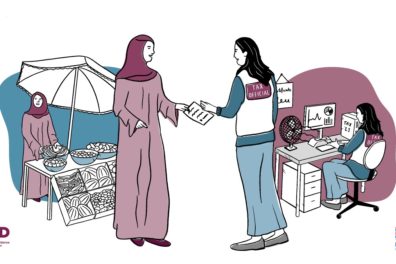The coordinator of the Community of Practice (CoP) on Gender and Taxation will manage the various administrative aspects of running the CoP and will be the primary person of contact that members can reach out to. A workplan for the CoP has been developed and the coordinator’s role will be largely consistent with that. Their responsibilities will include:
- Working with the conveners to create the research and technical sub-groups based on interests expressed by the members.
- The coordinator will be expected to set-up and coordinate meeting times with the members.
- At the end of the first meetings of sub-groups, the coordinator will circulate a survey to collect data on members’ ongoing projects and initiatives. A consolidated report will then be shared, based on which members will contribute to a mapping effort that will track major initiatives.
- The coordinator will be expected to take initiative in organising seminars and other public dissemination efforts.
- The coordinator will work with the convenors to release blogposts as part of the CoP series, which can be done along subgroup thematic lines.
- They will be the primary link across sub-groups and will be expected to expand discussions between them, and other interested parties who may not be members of the CoP.
- They will be expected to attend meetings of the Tax and Gender Working Group that has a greater advocacy focus. Based on these meetings, the coordinator will draw connections between the CoP and the TGWG, and report on opportunities to collaborate with actors on their forum.
- The coordinator will prepare memos after each CoP and sub-group meeting summarising the key learnings and messages.
- The coordinator will facilitate the preparation of a mid-term review of the CoP. At the end of the first year, they will be expected to present own and collective reflections on the work conducted by the Community of Practice and input strongly into future plans of the CoP.
- They will be asked to maintain a repository of all presentations and discussion notes from the CoP.
- The Coordinator will be asked to present the CoP and its progress to interested stakeholders.
- The coordinator will report to Caren Grown and Giulia Mascagni, the convenors of the CoP.
- The Coordinator will report to GET project team, on a monthly basis, the progress of the work he/she has achieved and the actions implemented by members of the CoP.
The work will be performed remotely.
Required profile
- Proven experience organizing and facilitating participatory events such as workshops, presentations, learning sessions, and webinars. Ideally experience in managing communities similar to the one described above;
- Links with the academic sphere (academic, former academic or having worked extensively with academics;
- Ability to work with international teams, networks of experts and communities of practice;
- Knowledge of the field of public finance is a plus;
- A Master’s degree or three years of work experience in a relevant field: knowledge management, communications, public policy, public management, business administration, international relations, or international development;
- Excellent analytical, writing, and communication skills;
- Fluency in English is required.
Project or context description
Background: France’s Strategic Investment Plan for Development and Gender Equality in Taxation (GET) project
The Strategic Investment Plan for Development (PISD) aims to achieve the objectives of the French interministerial strategy to support better mobilization of domestic public resources (MRIP) in developing economies. The PISD pays particular attention to modernizing tax and customs policies and administrations. As gender is a priority cross-cutting theme of the French Feminist Diplomacy, France supports actions aimed at strengthening gender equality in the tax and customs systems of developing economies to enable inclusive and sustainable growth. PISD focuses in particular on African countries.
The GET Gender Equality in Taxation project, funded by PISD, aims to help reduce gender inequalities in African tax and customs systems by supporting:
- Actions to reduce gender inequalities in the policies, organization and operation of tax and customs administrations in Africa.
- Structuring and promoting the advocacy aimed at reducing gender inequalities in tax and customs systems;
The GET project therefore targets gender inequalities at three levels within tax and customs systems:
- Tax and customs policies;
- Tax and customs administrations;
- Taxpayer/user services.
Based in West Africa, the project aims to cover West African countries as a priority, and the rest of the African economies in a second phase (Central, and East Africa).
With a strong research identity, the project aims to leverage knowledge production to identify and neutralize gender inequalities in tax and customs systems, to the benefit of partner administrations and their taxpayers.
The GET project also aims to create a network of partners working in a coordinated approach on the issue of gender inequalities in tax and customs systems. These relationships will be forged between tax and customs administrations, taxpayers and civil society organizations, the research community, international organizations and other technical and financial development partners.
The Gender and Tax community of Practice
The Community of Practice (CoP) on gender and tax was created as a result of a series of discussions that took place around the Annual Conference of the International Association of Feminist Economists (IAFFE). The CoP brings together practitioners and academics who are advancing the field of research looking at gender and tax, particularly on the technical and data aspects. Members include individuals working in international organisations, academia, civil society, and donors. All members participate in an individual capacity, and not as representing an institutional position. A concept note for the CoP was circulated by the conveners, Giulia Mascagni (ICTD Research Director) and Caren Grown (senior fellow in the Center for Sustainable Development at the Brookings Institution) and a final version accepted in December 2023. Members agreed that hiring a coordinator who would be able to dedicate time to the CoP would be beneficial. Expertise is funding this position through its GET project. Unlike the geographical focus mentioned above, the Community of Practice does not have a specific geographical focus, although particular attention will be given to lower income countries.
***
The GET project is funding the position of CoP Coordinator because the community development will contribute to:
- Better identify the interactions between taxation and gender and potential resulting inequalities;
- Produce knowledge on these inequalities and their consequences for administrations and taxpayers;
- Develop ideas/ways for reducing gender inequalities in taxation;
- Help raise awareness of the links between taxation and gender;
- Develop expertise on the links between taxation and gender via a network of stakeholders from different backgrounds (international organizations, academics, technical and financial development partners, etc.).
Apply here by March 4, 2024.



